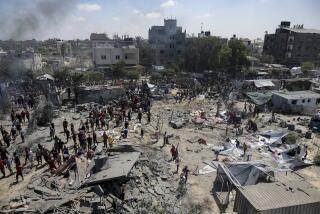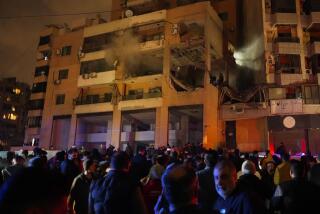Iraqi Official Dies Days After Attack
- Share via
BAGHDAD — One of just three women on the Iraqi Governing Council died Thursday after a five-day fight for her life, despite intensive efforts by U.S. doctors to save her from internal injuries inflicted by assassins’ bullets. Aqila Hashimi, a longtime diplomat who had worked in the Foreign Ministry under Saddam Hussein, was widely viewed as a nonpolitical professional who was devoted to her work, a promoter of women in the diplomatic corps and loyal to her country rather than to a particular leader.
The Governing Council declared three days of official mourning and issued an impassioned statement condemning her assassination and crowning Hashimi with the greatest praise that can be offered in Islam.
Hashimi died a “martyr on the path of struggle for freedom and democracy in the building of this great nation,” the statement said.
Her death sent a chilling reminder to Iraqis who work with the American-led Coalition Provisional Authority that they have violent enemies who are as willing to kill Iraqis as American forces.
Similarly, the drumbeat of attacks -- a bomb exploded outside a hotel housing staff of the NBC television network on Thursday morning, and two bombs exploded in the northern city of Mosul, injuring eight soldiers -- brought home how easy it is for the armed opposition to distract the world from Iraq’s progress toward normalization.
Hashimi was the second Iraqi political figure to be assassinated since the occupation authority began setting up an Iraqi government to serve until elections next year.
The first was Ayatollah Mohammed Bakr Hakim, a moderate Shiite Muslim clergyman who had returned from Iran in May to lead the Supreme Council for Islamic Revolution in Iraq. Hakim and 120 others died in a car bombing in the south-central city of Najaf on Aug. 29.
Hashimi, who eschewed the traditional Islamic head covering known as hijab, started her Foreign Ministry career in the 1970s as a translator. She was fluent in French and English, and many people expected her to become Iraq’s next ambassador to the United Nations.
Although she was the only figure from the old regime to serve on the Governing Council, she appeared to have been liked and trusted by her new colleagues.
“The whole Foreign Ministry staff are affected deeply,” said Omar Farooq, telecommunications director at the ministry. “She was a tolerant, moderate, realistic woman.... She was behind the decision to send female diplomats abroad -- that was a daring and great step. I don’t know who would have committed this crime against Miss Hashimi.”
Hoda Naji Said, a mother of three who lives in the same neighborhood as Hashimi, said her death was a particular loss for women. “She was a model for young women,” Said lamented. “She projected a good image of Iraqi women to the world outside.”
Council members blamed the shooting on loyalists of Hussein and upbraided the “faithless and hypocritical clique” responsible for her death.
“We renew our commitment to the people to stick with determination to the road of liberty and reconstruction of the country,” the statement said. “We will remain faithful to these goals.”
In other news in Baghdad, the commander of U.S. forces in Iraq said he could not confirm that the media were the target of the hotel bombing, the first attack against a facility housing a Western news organization.
Lt. Gen. Ricardo Sanchez said his investigation was not complete but that he considered the bombing part of the “terrorist objective” of harming representatives of the international community.
The three-star general followed his usual practice at news conferences of paying homage to the U.S. casualties of the past week. The toll was six killed in action, three dead of noncombat causes and 41 wounded. Since the war began March 20, 306 Americans have died and more than 1,300 have been wounded in action.
In an effort to improve morale among military personnel and their families, the U.S. Central Command accepted Sanchez’s recommendation for a rest-and-recreation program for troops who are being deployed for a year or more in Iraq.
Beginning Thursday, each service member assigned to Iraq for 12 months or more will become eligible for a vacation of up to 15 days in Europe or the United States.
The granting of the annual leaves was an indication that the Pentagon sees the necessity of keeping U.S. troops in Iraq for longer periods.
In Washington, critics continued their attack on the Bush administration’s plans for rebuilding Iraq, as L. Paul Bremer III, the U.S. administrator in that country, spent a fourth day testifying before congressional committees.
Lawmakers questioned the administration’s reconstruction plan and asked why Iraq should not be required to reimburse U.S. taxpayers for some of its portion of the $87 billion the administration is seeking in additional funding for activities in Iraq and Afghanistan.
Bremer insisted that Congress should approve the request and warned that failure to do so could undermine U.S. operations in Iraq.
“If we fail,” Bremer told the Senate Armed Services Committee, “we will have handed the terrorists a gift.”
Deputy Defense Secretary Paul D. Wolfowitz also defended the reconstruction effort.
“People should be extremely careful suggesting that young Americans are dying because of a lack of planning,” Wolfowitz told the House Armed Services Committee. “There has been an enormous amount of planning.”
Times staff writer Esther Schrader in Washington contributed to this report.
More to Read
Sign up for Essential California
The most important California stories and recommendations in your inbox every morning.
You may occasionally receive promotional content from the Los Angeles Times.













